Childhood relationships are super cute. They are very shy and excited about their new “boyfriend” or “girlfriend.” It helps them learn more about close relationships and friendships without risk. It also has many lessons about treating others kindly, not sharing their secrets, leaving them behind or otherwise hurting them.
But what if the kids do hurt each other? Should parents step in and teach them a lesson, punishing them, or should they let the kids figure it out? Reddit mom u/EfficientAd4006 shares her kid’s story about “cheating” in a relationship and how she and her husband disagree about the consequences of this.
More info: Reddit
Hearing that your primary school age child has a girlfriend or boyfriend may be surprising, but it’s cute and a good learning experience for them

Image credits: Lara604 (not the actual photo)
A mom wants to know if she’s wrong to not punish her 7 Y.O. for “cheating” on her boyfriend, i.e. holding hands and giving gifts to another kid too
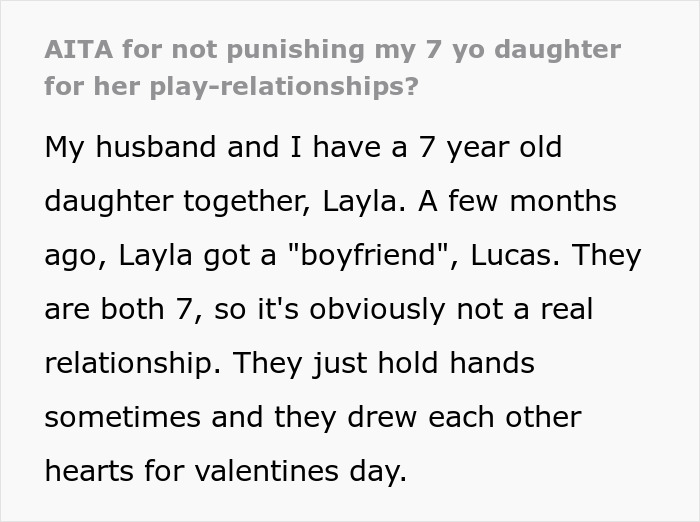
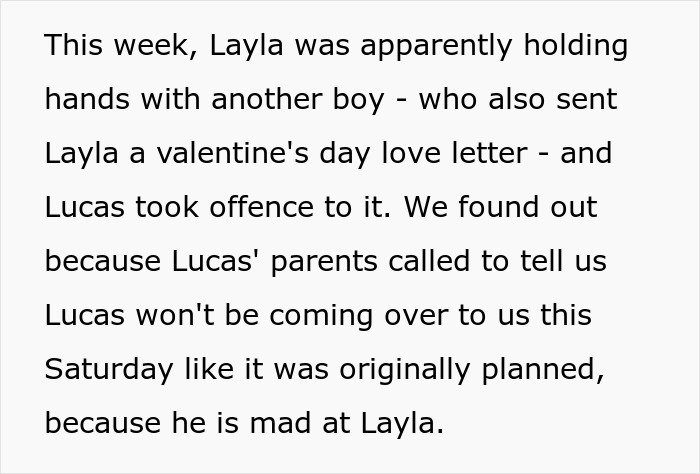
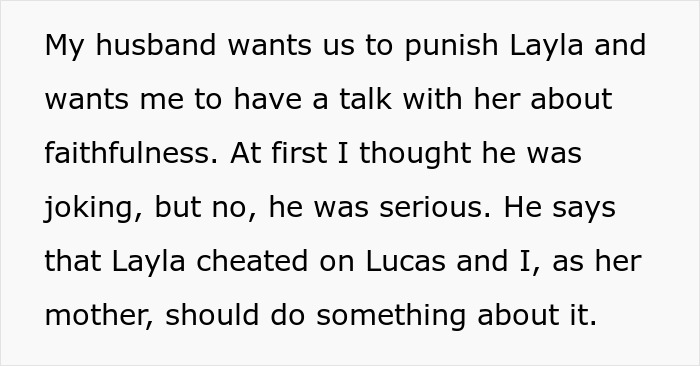
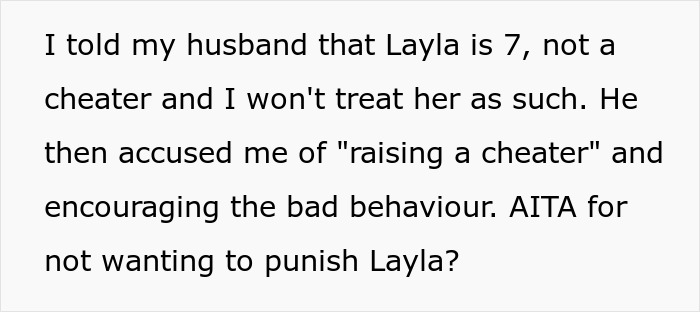
Image credits: EfficientAd4006
OP’s husband wanted to punish Layla, to which the mom refused, thinking it isn’t that serious, but the father said that she was “raising a cheater”
The Original Poster (OP) begins the story by saying that she has a 7-year-old daughter named Layla with her husband. Layla got her first boyfriend, named Lucas, several months ago. As they are 7, their relationship is limited to holding hands and giving cute gifts to each other such as drawings of hearts for Valentine’s Day.
The trouble arose when Layla was spotted holding hands with another boy, who also sent her Valentine’s day cards. Lucas was upset by this, and Layla and her family were informed about this by the “boyfriend’s” parents, informing them that Lucas wouldn’t be coming over during the weekend because he was mad at Layla.
This sparked a conflict between the parents because the dad wants to punish Layla and have a serious conversation with her about being faithful. The mom thought that he was kidding at first, but was surprised to find that he was actually serious. The father says that Layla cheated on Lucas and that OP should do something about it for some reason.
The mom dug her heels in, saying that she refuses to discipline her as Layla is 7, not a cheater, and that it’s not that serious. The husband then escalated, accusing her of “raising a cheater” and encouraging Layla’s behavior. At this point, the mom wanted some more input on the situation and asked the internet whether she was a jerk for not disciplining Layla in this case.

Image credits: B&M Stores (not the actual photo)
For this article, Bored Panda got in touch with Dr. Emily Edlynn to ask for advice for parents who find themselves in similar situations. Emily has a Master’s and Doctorate degree in clinical psychology. She has a small private practice with children, teenagers, and adults, specializing in health psychology, striving to help modern families find calm in the chaos of modern parenting.
You can read more about her on her website, where you can also preorder her book about autonomy-supportive parenting strategies.
When asked whether parents should encourage or discourage their children from getting into play relationships, Emily suggested that parents stay open to their kids exploring play relationships. As each child will approach this differently, it’s important to accept children’s curiosity and interests, as it allows them to develop naturally instead of them feeling pressure to act one way or another.
If you were wondering what you should talk to your child about when you see them exploring relationships, Dr. Emily has you covered. You should bring up the importance of consent and communicate to them that they should always have a choice and give a choice when it comes to physical interactions.
For example, ensure that the child wants to hold hands with another child and they aren’t just doing it “to be nice.” If a child wants to hold hands with another child, teach them to ensure that the other person is okay with it by asking, “is it okay if I hold your hand?” These lessons, at an early age, lay down a solid foundation for a child having agency over their own body and respecting the agency of others at the same time.
As for the emotional part of children’s first crushes, a parent can show curiosity about their child’s experience and understanding of the relationship by asking open-ended questions like “what does it mean if you hold hands with someone else?” If they use the words “girlfriend” or “boyfriend,” ask, “how is that different from your other friends?”
The answers from the child’s perspective are important because adults have more sophisticated understandings of relationships that children aren’t ready for. It’s best to see them described by the child, with their terms.
Finally, if parents disagree about their children’s relationships, they should do it in private, away from their child, Dr. Emily says. It’s also important to consider that we bring our own emotions and unresolved issues into parenting, so it’s important to be open about what may be emotionally triggering in a parenting situation.

Image credits: Janine (not the actual photo)
Children getting into relationships is good for them as it is very educational, helping them see what people are like, what they like, and learning not to hurt others with inconsiderate behavior. But what are the things that you should look out for? What is an appropriate age for your kids to start having playdates, and when should you have a serious conversation about it with them? An article by PureWow dives into this issue.
After being asked when it is too early for a child to start dating, the experts say that our definitions of “boyfriend’ or “girlfriend” may have a different meaning to us than to our children. People define these concepts differently at every stage of life, so you should both clearly communicate what you mean. Alas, there is no specific age when kids should start having relationships, as it varies highly depending on the child’s maturity.
If your child comes back from school with a new “significant other” and they tell you that they’ve kissed, you shouldn’t be alarmed. It’s important to understand that from the kid’s perspective, the kiss was not malicious or sexual. These relationships and actions are far more innocent and less serious than we consider them to be. This could also be a good moment for you to talk about boundaries, consent and other topics related to relationships.
Finally, how should you decide when your child is old enough to date? You should weigh whether they are mature enough for it. Do they understand what a relationship is? How to handle themselves and others, and how to set boundaries? There is no one solution for every child, and you should take your child’s maturity and feelings into consideration first and foremost.
The post collected more than 27 thousand upvotes and almost 3 thousand comments in less than 4 days. The thread was soon locked by the moderators, as the discussion must’ve gotten too heated for the subreddit. The commenters decided that OP was not the jerk, with most commenting on the strangeness of the father’s views.
The commenters were stunned by this situation, backing OP up, but suggesting that it would be worthwhile to talk about boundaries and feelings with the daughter
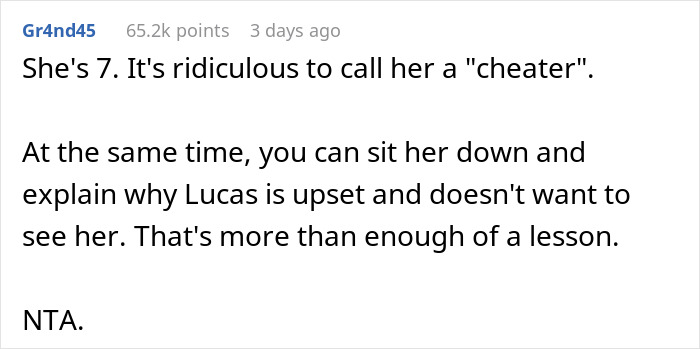
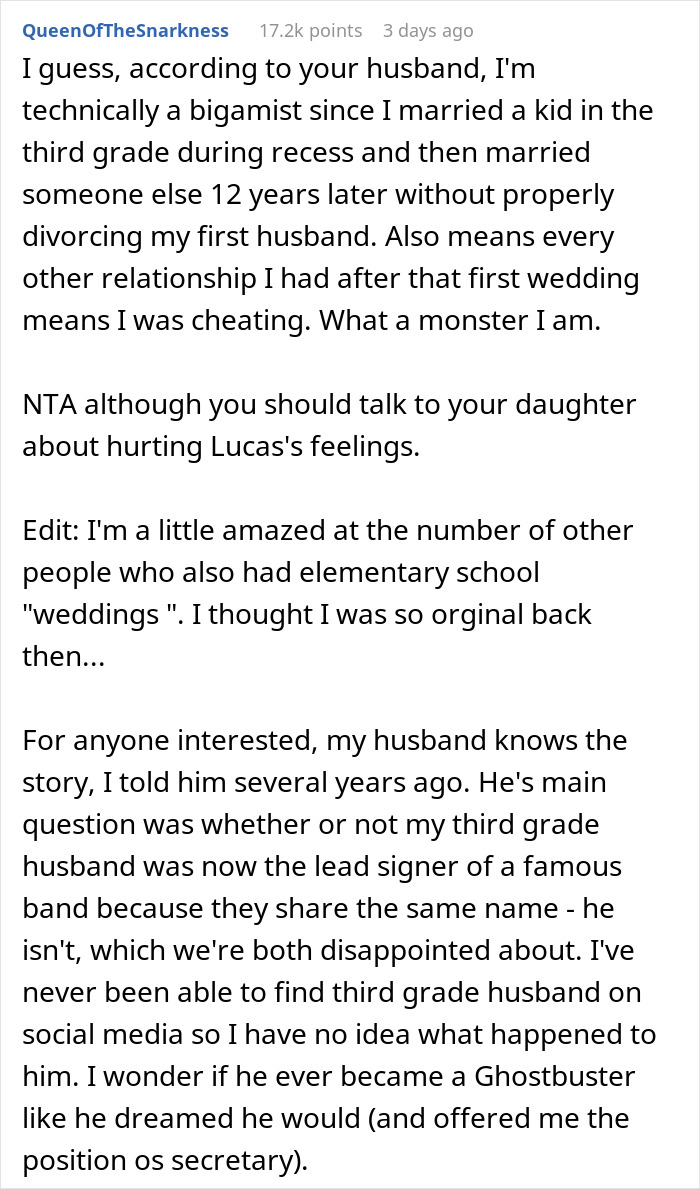
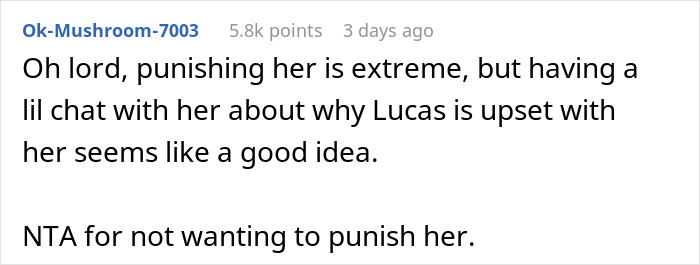
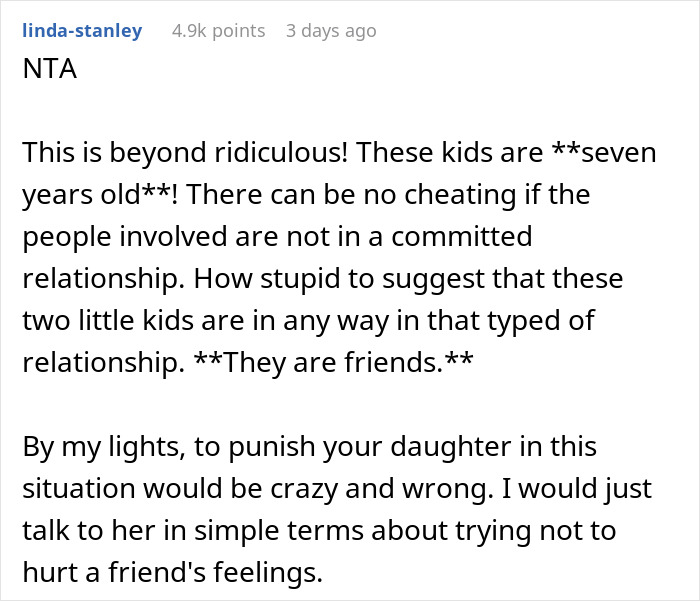


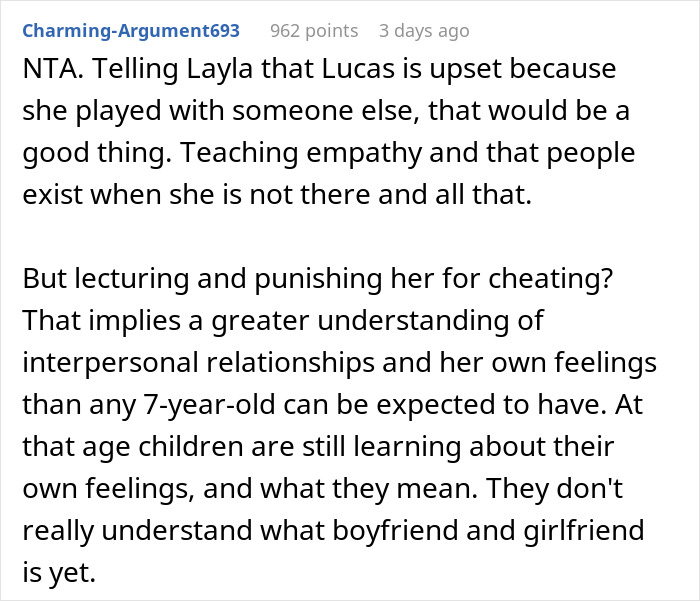

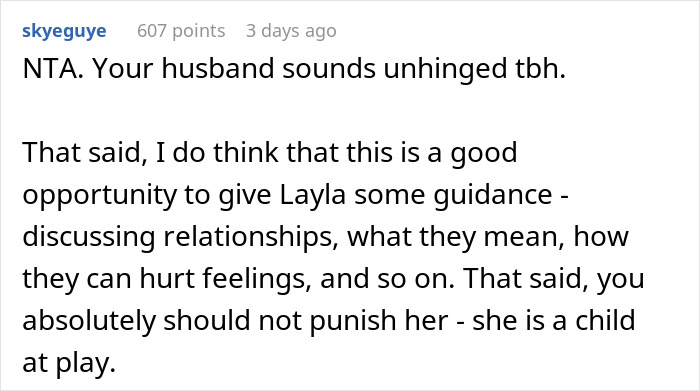
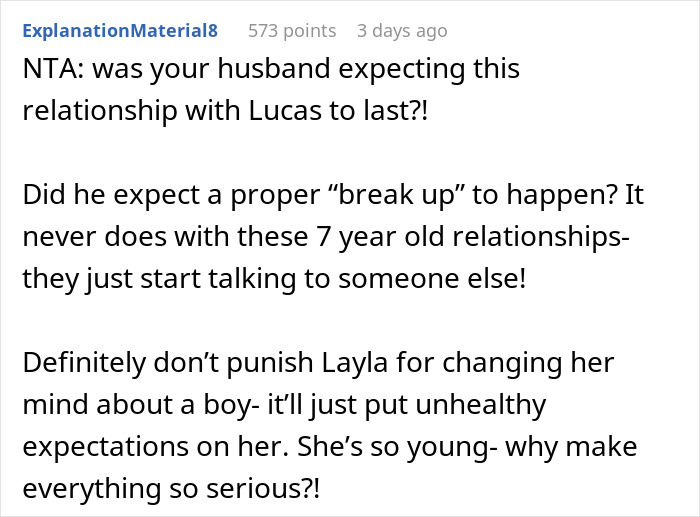
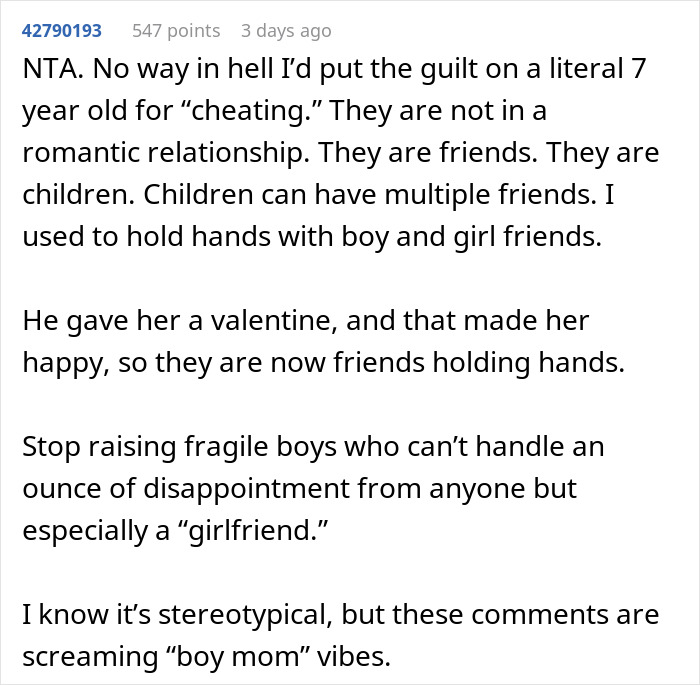

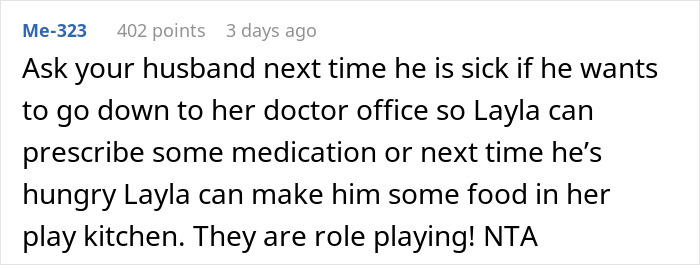
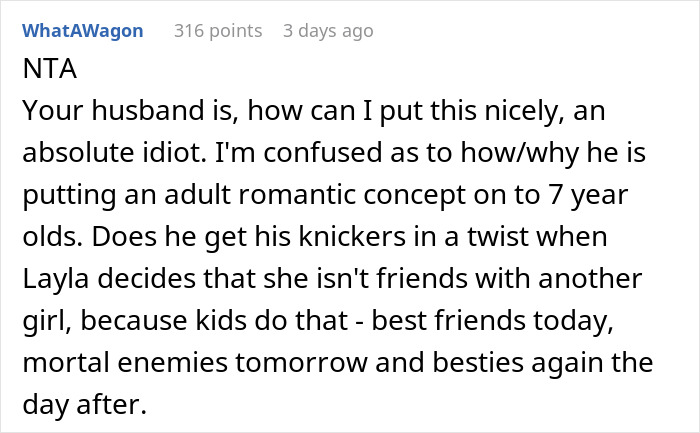
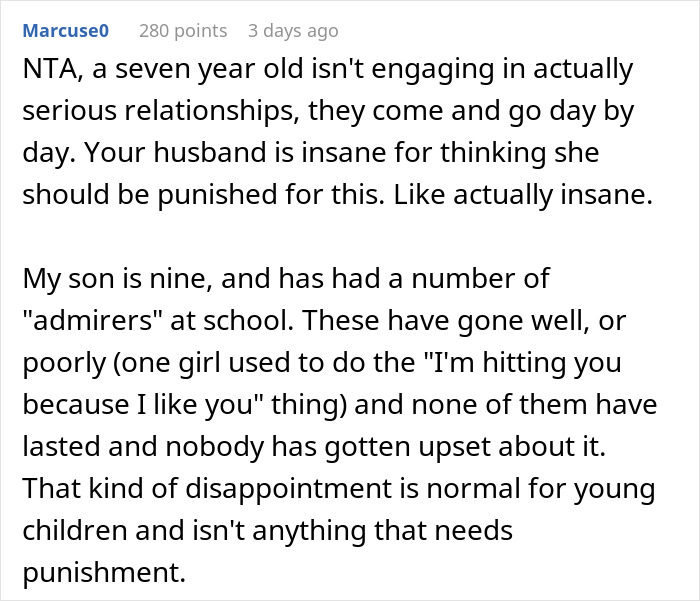
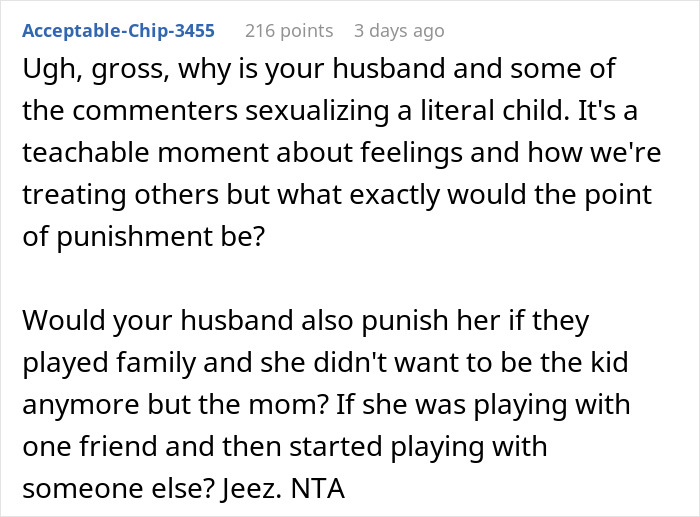

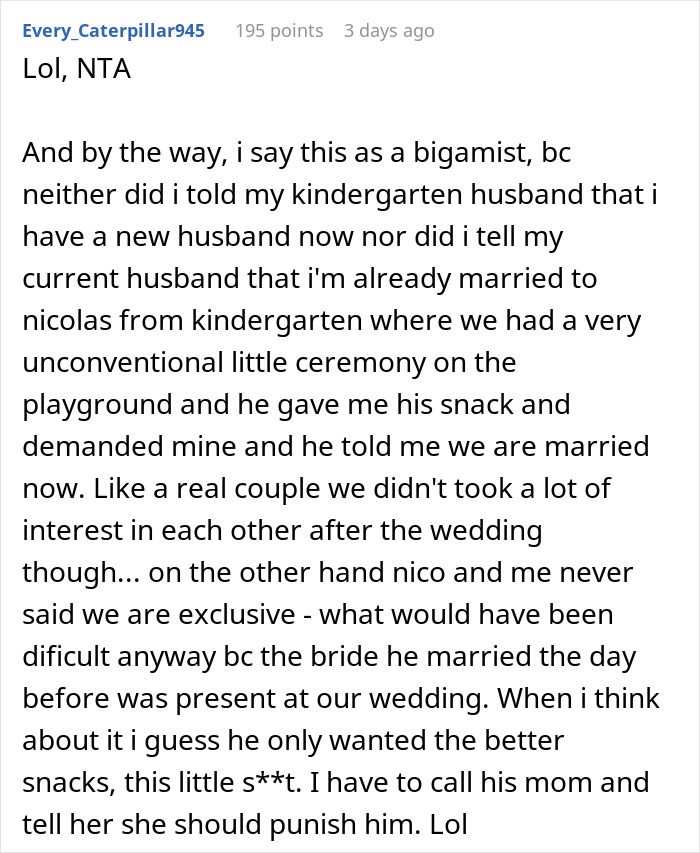
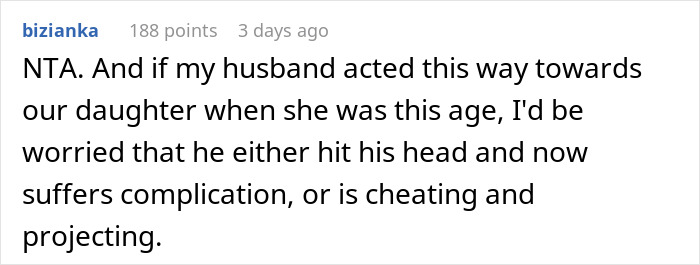



The post "My Husband Wants Us To Punish Layla": Parents Disagree Over Whether To Punish 7 Y.O. For “Cheating On Boyfriend” first appeared on Bored Panda.

















